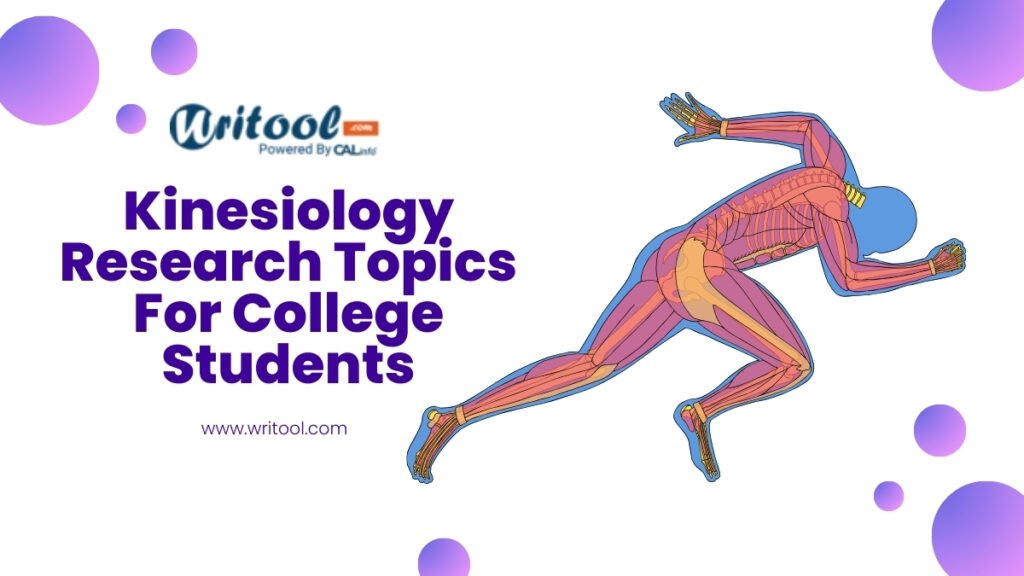Unlock exciting kinesiology research topics for college students. Explore the secrets of movement, delve into sports, fitness, and muscle mysteries, and ignite your curiosity. Dive into our handpicked list for an engaging journey of discovery!
Hey everyone, fellow college peeps! Let’s chat about something rad: kinesiology research topics. I know, “kinesiology” sounds fancy, but it’s just about how our bodies move and groove. And trust me, it’s fascinating!
Whether you’re into sports, hitting the gym, or just curious about muscle magic, kinesiology’s got some seriously cool stuff to explore.
So, if you’re down to delve into the science behind movement, pull up a chair, and let’s dive into some epic kinesiology research topics together!
Importance of Choosing the Right Research Topic
Choosing the right research topic is crucial because:
- Focus and Direction: A good topic guides your research.
- Interest and Engagement: It keeps you motivated.
- Feasibility and Resources: It needs to be doable.
- Originality and Contribution: Aim for something new.
- Impact and Significance: Consider real-world importance.
Some tips
- Brainstorm: Follow your interests.
- Talk to Others: Get advice from experts.
- Research: Find gaps in knowledge.
- Be Specific but Broad: Make it manageable.
- Consider Methods: Ensure you can gather data.
By following these tips, you’ll choose a topic that sets you up for success.
General Kinesiology Research Areas
Key areas include:
- Biomechanics: Forces in movement, improving performance, preventing injuries.
- Exercise Physiology: How exercise affects organs, designing programs.
- Motor Control: Brain’s role in movement, aiding rehab.
- Sport Psychology: Mental aspects of sports, enhancing performance.
- Physical Activity and Health: Benefits of exercise, promoting activity.
- New areas continually emerge in kinesiology research.
Kinesiology Research Topics For College Students
Check out Kinesiology research topics for college students:-
Exercise Physiology
- How does exercise affect heart health?
- Gender differences in exercise responses.
- Exercise and mental well-being.
- Muscle metabolism during exercise.
- Aging and exercise effects.
- Exercise for chronic disease management.
- Environmental factors in exercise.
- Stretching’s impact on performance.
- Exercise and immune function.
- Effects of different types of exercise.
Biomechanics
- Forces in sprinting.
- Joint forces during weightlifting.
- Biomechanics of running surfaces.
- Sports injury mechanisms.
- Gait patterns in neurological disorders.
- Footwear and performance.
- Swimming efficiency biomechanics.
- Throwing techniques analysis.
- Balance in older adults.
- Human movement for robotics.
Motor Control
- Brain’s role in movement.
- Proprioception and coordination.
- Motor control after injury.
- Child motor development.
- Enhancing athletic performance.
- Neuroplasticity in rehab.
- Attention and movement.
- Expert vs. novice athletes.
- Feedback in skill learning.
- Motor control in neurological disorders.
Sport Psychology
- Athlete motivation factors.
- Stress and performance.
- Mental skills for athletes.
- Team cohesion effects.
- Coping with sports injuries.
- Self-talk and imagery impact.
- Referee decision psychology.
- Athlete burnout prevention.
- Parental influence in sports.
- Mental health in sports.
Adapted Physical Activity
- Exercise for disabilities.
- Barriers to activity participation.
- Inclusive sports programs.
- Quality of life improvements.
- Assistive technology benefits.
- Social support for disabilities.
- Adapted sports impact.
- Accessibility in sports.
- Lifelong activity for disabilities.
- Adaptive equipment benefits.
Exercise and Nutrition
- Diet and exercise performance.
- Nutrition for exercise recovery.
- Hydration in sports.
- Micronutrients and performance.
- Dietary supplements impact.
- Nutrition education for athletes.
- Preventing overtraining.
- Diet and body composition.
- Bone health and diet.
- Fasting and performance effects.
Health and Wellness
- Exercise and mental health.
- Workplace wellness impact.
- Sleep and physical activity.
- Mindfulness benefits.
- Sedentary behavior effects.
- Stress reduction through exercise.
- Exercise and sleep quality.
- Physical activity and immunity.
- Exercise and bone density.
- Ergonomics for health.
Rehabilitation and Injury Prevention
- Prehabilitation benefits.
- ACL reconstruction rehab.
- Aquatic therapy advantages.
- Concussion recovery criteria.
- Biopsychosocial injury factors.
- Virtual rehab after stroke.
- Manual therapy effectiveness.
- ACL injury prevention methods.
- Elderly joint surgery rehab.
- Youth athlete injury prevention.
Sports Performance Enhancement
- Mental imagery benefits.
- Sleep quality’s role.
- Recovery optimization strategies.
- Periodization importance.
- Tapering for competition.
- Ergogenic aids effects.
- Music’s impact on performance.
- Altitude training benefits.
- Heat acclimatization advantages.
- Biofeedback in training.
Environmental Physiology
- Heat stress effects.
- Hydration in heat.
- Altitude and exercise.
- Cold exposure impact.
- Environment and chronic disease.
- Air pollution and exercise.
- Clothing’s environmental role.
- Wind resistance effects.
- Extreme weather in sports.
- Heat illness prevention.
Sports Nutrition
- Carbs and endurance.
- Protein for recovery.
- Caffeine’s performance impact.
- Body composition nutrition.
- Fats and endurance.
- Electrolytes and hydration.
- Antioxidants for recovery.
- Post-exercise nutrition timing.
- Vegetarian athlete diet.
- Probiotics and performance.
Aging and Exercise
- Cognitive benefits of exercise.
- Resistance training in aging.
- Promoting elderly activity.
- Exercise for fall prevention.
- Chronic disease in aging.
- Motor control changes.
- Bone health and exercise.
- Immune function in aging.
- Social support in elderly activity.
- Aquatic exercise for seniors.
Exercise and Chronic Disease
- Exercise in disease management.
- Exercise for diabetes.
- Cardiovascular disease and exercise.
- Hypertension exercise strategies.
- Inflammation and exercise.
- Cancer patient exercise benefits.
- Arthritis exercise benefits.
- Pulmonary function and exercise.
- Obesity exercise considerations.
- Mental health benefits in chronic disease.
Sports Injury Management
- Manual therapy in injury treatment.
- Shoulder injury rehab.
- Ankle sprain prevention.
- Hamstring strain return criteria.
- Bracing and taping effects.
- Patellar tendonitis rehab.
- Psychology in injury recovery.
- Blood flow restriction rehab.
- Overuse injury rehab.
- ACL injury prevention.
Sports Performance Analysis
- Video analysis in sports.
- Wearable tech for performance.
- Biomechanics simulation.
- Smart equipment benefits.
- Sports data analytics.
- 3D printing in sports.
- Video coaching software.
- AI in talent identification.
- Biofeedback in training.
- Sports tech innovation hubs.
Physical Education and Pedagogy
- Physical literacy promotion.
- Inclusive PE strategies.
- PE assessment methods.
- Teacher training impact.
- Technology in PE.
- Motivation in PE.
- Teaching games approach.
- Social-emotional learning in PE.
- Culturally relevant PE.
- Lifelong activity promotion.
Sports Governance and Policy
- Doping’s impact on governance.
- Gender equity policies.
- Athlete rights issues.
- National governing body roles.
- Media influence on governance.
- Sports diplomacy benefits.
- Sports betting regulations.
- Anti-discrimination policies.
- Youth sports development.
- Sports-politics intersection.
Sports Sociology and Culture
- Gender in sports stereotypes.
- Race and ethnicity in sports.
- Socioeconomic factors in sports.
- Sports and identity formation.
- Globalization of sports.
- Sports and nationalism.
- Disability inclusion in sports.
- Sports celebrity culture.
- Indigenous sports preservation.
- Sports commodification.
Sports Economics and Marketing
- Economic impact of sports events.
- Revenue generation in sports.
- Analytics in sports business.
- Sponsorship strategies.
- Sports broadcasting economics.
- Stadium financing models.
- Global sports branding.
- Sports gambling effects.
- Athlete endorsements.
- Local economy impacts.
Sports Technology and Innovation
- Wearables for performance.
- VR/AR in sports training.
- Biomechanics simulation.
- Smart sports equipment.
- Sports data analytics.
- 3D printing in sports.
- Video analysis software.
- AI in talent identification.
- Biofeedback in training.
- Sports tech innovation hubs.
These topics offer a wide range of research opportunities for kinesiology students.
Kinesiology Research Topics For College Students Based on Skillset
Selecting a Kinesiology research topic is exciting yet challenging. Here’s how to pick one that suits you:
For Math and Science
- Study a specific movement’s biomechanics.
- Compare training program effectiveness.
For Writing and Communication
- Research exercise’s mental effects.
- Explore Kinesiology’s history.
For Data Analysis
- Assess wearable tech’s impact on exercise.
- Study sleep quality and athletic performance.
For Specific Groups
- Examine exercise benefits for the elderly.
- Investigate Kinesiology in pediatric rehab.
Choose what interests you most and seek guidance from professors.
Kinesiology Research Topics For College Students Based on Levels
Kinesiology Research Topics for College Students by Level
Introductory Courses (Freshmen/Sophomores)
- Biomechanics: Preventing exercise injuries with proper form.
- Exercise Physiology: Comparing aerobic vs. anaerobic exercise effects.
- Motor Control: How music tempo impacts coordination.
- Sport Psychology: Boosting athlete confidence with routines.
- Physical Activity and Health: Benefits of daily exercise for different ages.
Intermediate Courses (Juniors)
- Biomechanics: Barefoot vs. shod running efficiency.
- Exercise Physiology: HIIT for weight management.
- Motor Control: Improving balance with visual feedback.
- Sport Psychology: Impact of sleep quality on performance.
- Physical Activity and Health: Exercise’s role in mental health.
Advanced Courses/Research Projects (Seniors/Graduate Students)
- Biomechanics: Developing new movement models.
- Exercise Physiology: Dietary interventions for recovery.
- Motor Control: VR for stroke rehabilitation.
- Sport Psychology: Mindfulness for reducing anxiety.
- Physical Activity and Health: Tailored interventions for chronic conditions.
Research Methodologies in Kinesiology
Here’s an overview of research methods:
Quantitative Methods
- Focus: Gather numerical data, analyze statistically.
- Examples: Experiments, Field Studies, Surveys.
Qualitative Methods
- Focus: Understand experiences related to movement.
- Examples: Interviews, Focus Groups, Ethnography.
Mixed Methods
- Combination: Integrate quantitative and qualitative methods.
Additional Considerations
- Research Design: Choose the right design.
- Ethical Considerations: Adhere to guidelines.
- Data Analysis: Use statistical software for quantitative data; coding for qualitative data.
Benefits of Different Methodologies
- Quantitative methods: Provide evidence for cause-and-effect.
- Qualitative methods: Offer insights into experiences.
- Mixed methods: Provide a holistic understanding.
Understanding these methods enhances the study of human movement in kinesiology.
Tips for Selecting a Kinesiology Research Topics
Choosing a research topic in Kinesiology is about matching your interests with the study of human movement. Here’s how:
Spark Curiosity
- Personal Interests: What parts of movement interest you?
- Current Events: Any new developments in fitness or technology?
- Real-World Issues: Identify local physical activity challenges.
Focus and Refine
- Narrow down your interest to a specific research question.
- Ensure it’s manageable for a research project.
Explore Existing Research
- Check what research exists in your area.
- Look for gaps or unanswered questions.
Consider Methodology and Resources
- Decide how you’ll collect data.
- Consider if you need specific software or expertise.
Areas to Explore
- Exercise Physiology
- Biomechanics
- Motor Control
- Sport Psychology
- Adapted Physical Activity
Additional Tips
- Discuss ideas with your advisor.
- Think about the real-world impact.
- Choose a topic that excites you.
Examples of Kinesiology Research Studies
Here are some simple examples of Kinesiology research studies:
Exercise Physiology
- Title: HIIT vs. MICE for Weight Loss in Adults with Obesity
- Methodology: Compare HIIT and MICE for weight loss.
- Impact: Guide weight management programs.
Biomechanics
- Title: Impact of Footwear on Running Efficiency
- Methodology: Analyze running mechanics with different shoes.
- Impact: Improve shoe design for reducing injuries.
Motor Control
- Title: Effects of Virtual Reality Training on Older Adults
- Methodology: Compare virtual reality to traditional exercises.
- Impact: Develop fall prevention strategies.
Sport Psychology
- Title: Impact of Mindfulness Meditation on Athletes
- Methodology: Study meditation’s effects on anxiety.
- Impact: Improve mental skills training.
Adapted Physical Activity
- Title: Effectiveness of Aquatic Exercise on Osteoarthritis
- Methodology: Examine aquatic exercise benefits.
- Impact: Develop tailored interventions for osteoarthritis.
Resources for Finding Kinesiology Research Topics
Check out the resource for finding kinesiology research topics:-
Academic Databases
- Use databases like PubMed, SPORTDiscus, or ERIC.
- Look for review articles or meta-analyses for summaries and research gaps.
Professional Organizations
- Check websites of organizations like ACSM, NSCA, or AKA.
- Explore their journals, conferences, and dedicated sections for ideas.
News and Current Events
- Stay updated on health, fitness, and sports news.
- Look for trends, technologies, or controversies for research ideas.
Government Websites
- Visit sites like NIH or CDC for funding opportunities.
- Explore their priorities for research insights.
Brainstorming Techniques
- Use mind maps to explore subtopics and questions.
- Try freewriting to spark ideas without censoring.
Talk to Experts
- Discuss ideas with professors or kinesiology professionals.
- Get insights and guidance from their experience.
What are some research topics in sports?
Here are some key areas you might explore:
Sports Performance and Training
- Technique: Improve sports movements with technology.
- Training: Compare different methods for better performance.
- Nutrition: Study how diet affects athletes.
Sports Psychology
- Mental Game: Explore mental training’s impact on performance.
- Motivation: Understand what drives athletes.
- Injuries: Study the mental side of recovering from injuries.
Sports Analytics
- Performance Prediction: Use data to predict outcomes and risks.
- Talent Identification: Identify potential athletes using data.
- Strategy: Analyze data for better game strategies.
Sports and Society
- Gender in Sports: Study gender differences and inequalities.
- Social Impact: Explore how sports can drive social change.
- Economics: Analyze sports’ economic effects on communities.
These areas offer a glimpse into the diverse world of sports research.
What are good research questions in exercise science?
A strong research question in exercise science is focused, doable, and offers new insights. Here’s what makes a good one:
- Specific: Narrowly targets one aspect of a topic.
- Feasible: Can be done with available resources.
- Clear: Easy to understand.
- Measurable: Involves things that can be measured.
- New: Addresses a gap in what we know.
Here are examples
Biomechanics
- Does plyometric training help basketball players jump higher than weight training?
- How does backpack weight affect how kids walk?
Exercise Physiology
- What’s the best mix of exercise intensity and time for obese adults to lose fat?
- Does caffeine before exercise help cyclists perform better?
Motor Control
- Can video game balance training stop elderly falls?
- Does mirror therapy speed up stroke patient recovery?
Sport Psychology
- How does music tempo affect motivation during HIIT?
- Can mental imagery help basketball players shoot more accurately?
Physical Activity and Health
- Do urban green spaces make people more active?
- How do workplace wellness programs affect employee health?
Talk to experts to refine your idea!
Why is research important in kinesiology?
Research is vital in kinesiology for these reasons:
- Knowledge Expansion: It helps us learn more about human movement, exercise, and biomechanics, guiding best practices.
- Evidence-Based Decisions: Research ensures recommendations are based on proven facts rather than anecdotes.
- Innovation Driver: It fuels advancements in technology like wearable trackers and VR for rehab.
- Public Health Insights: Research links physical activity to health, aiding in designing effective public health campaigns.
- Continuous Exploration: It sparks new questions, keeping kinesiology dynamic and evolving.
In summary, research is the backbone of kinesiology, improving practices and enhancing human health and performance.
Benefits of Kinesiology Research Topics For College Students
Researching kinesiology as a college student brings:
Knowledge & Skills
- Deepens understanding of specific areas like biomechanics.
- Sharpens critical thinking and communication skills.
- Offers hands-on experience in research methods.
Personal & Professional Growth
- Boosts confidence in problem-solving.
- Enhances competitiveness for future opportunities.
- Helps discover passions within kinesiology.
- Expands professional network through collaborations.
Overall Well-being
- Provides intellectual stimulation and time management practice.
- Gives a sense of achievement upon completion.
Engaging in kinesiology research enriches your journey, offering valuable skills and personal growth.
Conclusion
In essence, delving into kinesiology research topics during your college years presents an incredible opportunity. It enables you to expand your knowledge, hone essential skills, and undergo personal and professional growth.
Engaging in research allows you to delve into areas that spark your interest and equip yourself for future pursuits. It’s not solely about academic achievements; it’s about forging your own journey and positioning yourself for triumphs ahead.


